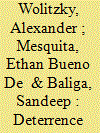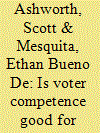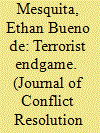|
|
|
Sort Order |
|
|
|
Items / Page
|
|
|
|
|
|
|
| Srl | Item |
| 1 |
ID:
172531


|
|
|
|
|
| Summary/Abstract |
We pose the commensurability problem: When do the estimates generated by actual research designs correspond to quantities of theoretical interest? We study this question in settings where both treatment and outcome are behavior and the treatment effect of interest is decomposable into direct and informational channels. We establish two results. First, the quantity estimated by an actual research design is only commensurate with the total effect in the ideal experiment if treatment status in the research design is a sufficient statistic for the decision-makers’ information. Second, a research design corresponding to a nonideal experiment isolates just the direct effect in the ideal experiment if two conditions hold: (i) there is no information effect in the nonideal experiment and (ii) the decision-maker’s response function is additively separable in treatment and information. We apply our results to three substantive literatures: the efficacy of protest, the empowerment of female candidates, and indiscriminate violence in counterinsurgency.
|
|
|
|
|
|
|
|
|
|
|
|
|
|
|
|
| 2 |
ID:
060950


|
|
|
| 3 |
ID:
175284


|
|
|
|
|
| Summary/Abstract |
Motivated by recent developments in cyberwarfare, we study deterrence in a world where attacks cannot be perfectly attributed to attackers. In the model, each of attackers may attack the defender. The defender observes a noisy signal that probabilistically attributes the attack. The defender may retaliate against one or more attackers and wants to retaliate against the guilty attacker only. We note an endogenous strategic complementarity among the attackers: if one attacker becomes more aggressive, that attacker becomes more “suspect” and the other attackers become less suspect, which leads the other attackers to become more aggressive as well. Despite this complementarity, there is a unique equilibrium. We identify types of improvements in attribution that strengthen deterrence—namely, improving attack detection independently of any effect on the identifiability of the attacker, reducing false alarms, or replacing misidentification with non-detection. However, we show that other improvements in attribution can backfire, weakening deterrence—these include detecting more attacks where the attacker is difficult to identify or pursuing too much certainty in attribution. Deterrence is improved if the defender can commit to a retaliatory strategy in advance, but the defender should not always commit to retaliate more after every signal.
|
|
|
|
|
|
|
|
|
|
|
|
|
|
|
|
| 4 |
ID:
133945


|
|
|
|
|
| Publication |
2014.
|
| Summary/Abstract |
A long research tradition in behavioral political science evaluates the performance of democracy by examining voter competence. This literature got its start arguing that voters' lack of information undermines a defense of democracy rooted in electoral accountability. A more recent literature deepens the debate, with some authors claiming that voters effectively use cues to substitute for information about candidates and policies, and other authors claiming that voters are insufficiently rational to do so. We argue that, regardless of its conclusions about voter competence, this literature's single-minded focus on voter behavior is misguided. We use a sequence of formal models to show that traditional intuitions are incomplete because they ignore the effect that changes in voter behavior have on the equilibrium behavior of politicians. When this strategic interaction is taken into account, increases in voter information or voter rationality sometimes make democratic performance better and sometimes make democratic performance worse. One simply cannot assess the implications of voter characteristics for democratic performance without also studying how those characteristics affect the behavior of politicians.
|
|
|
|
|
|
|
|
|
|
|
|
|
|
|
|
| 5 |
ID:
077291


|
|
|
|
|
| Publication |
2007.
|
| Summary/Abstract |
I present a model of interactions between voters, a government, and a terrorist organization. The model focuses on a previously unexplored conceptualization of counterterrorism as divided into tactic-specific observable and general unobservable tactics. When there is divergence between voters and government preferences, strategic substitution among different modes of attack by terrorists and agency problems between the voters and government create a situation in which the politically optimal counterterrorism strategy pursued by the government in response to electoral and institutional incentives is quite different from the security maximizing counterterrorism strategy. In particular, in response to electoral pressure, the government allocates resources to observable counterterror in excess of the social optimum. This problem is particularly severe when governments put great weight on rent-seeking or care less about counterterror than do voters and when terrorists have a large set of tactics from which to choose. Voters can decrease the magnitude of the agency problem by increasing the benefits of reelection by, for example, slackening requirements for nonsecurity related public goods
|
|
|
|
|
|
|
|
|
|
|
|
|
|
|
|
| 6 |
ID:
193663


|
|
|
|
|
| Summary/Abstract |
How do different types of motivation influence the politics of collective action? We study a model of endogenous rebellion and repression to understand how different types of individual motivation affect participation, state repression, and the mechanisms by which state violence affects political contention. Unlike psychological rewards, material rewards are divided among successful rebels. Thus, in material rewards settings, repression that decreases mobilization and chances of success also increases participants’ share of the rewards, reducing repression’s effect. Consequently, materially rather than psychologically motivated groups are less affected by repression and face less repression, but they are also less able to turn early failures into future successes. Moreover, because repression is more effective and used more when rebels are psychologically motivated, rebel motivations are a confounder in estimates of the relationship between repression and mobilization. This can lead to overestimation of repression’s effect and to more statistically significant results exactly when repression is more effective.
|
|
|
|
|
|
|
|
|
|
|
|
|
|
|
|
| 7 |
ID:
100765


|
|
|
|
|
| Publication |
2010.
|
| Summary/Abstract |
I study how a revolutionary vanguard might use violence to mobilize a mass public. The mechanism is informational-the vanguard uses violence to manipulate population member's beliefs about the level of antigovernment sentiment in society. The model has multiple equilibria, one equilibrium in which there may be revolution and another in which there is certain not to be. In the former, structural factors influence expected mobilization, whereas in the latter they do not. Hence, the model is consistent with structural factors influencing the likelihood of revolution in some societies but not others, offering a partial defense of structural accounts from common critiques. The model also challenges standard arguments about the role of revolutionary vanguards. The model is consistent with vanguard violence facilitating mobilization and even sparking spontaneous uprisings. However, it also predicts selection effects-an active vanguard emerges only in societies that are already coordinated on a participatory equilibrium. Hence, a correlation between vanguard activity and mass mobilization may not constitute evidence for the causal efficacy of vanguards-be it through creating focal points, providing selective incentives, or communicating information.
|
|
|
|
|
|
|
|
|
|
|
|
|
|
|
|
| 8 |
ID:
061486


|
|
|
|
|
|
|
|